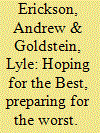| Srl | Item |
| 1 |
ID:
006351


|
|
|
|
|
| Publication |
Washington, D.C., National Defence University Press, 1990.
|
| Description |
v.7 (ix, 231p.)
|
|
|
|
|
|
|
|
|
|
|
|
Copies: C:1/I:0,R:0,Q:0
Circulation
| Accession# | Call# | Current Location | Status | Policy | Location |
| 037546 | 355.4/GIL 037546 | Main | On Shelf | General | |
|
|
|
|
| 2 |
ID:
075732


|
|
|
|
|
| Publication |
2006.
|
| Summary/Abstract |
In the post-Cold War strategic environment, Beijing could plausibly have opted for Soviet-style geostrategic competition with Washington, but it has not. Chinese leaders have not thus far, and almost certainly will never, amass thousands of nuclear weapons on hair-trigger alert or deploy significant forces to a network of bases spanning the globe. Nevertheless, the below assessment of China's increasing hard and soft power yields the conclusion that a Chinese challenge to US hegemony cannot be ruled out. The United States must prudently maintain military forces appropriate to facing a potential peer competitor. At the same time, however, Washington must engage in a process of creative diplomacy that simultaneously matches China's soft power and engages seriously with Beijing to create areas of consensus and cooperation.
|
|
|
|
|
|
|
|
|
|
|
|
|
|
|
|